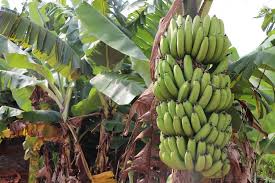
Bananas may be beneficial for people with chronic obstructive pulmonary disease (COPD). They are potassium-rich and contain antioxidants and fibre. Other sources of these nutrients are berries and whole grains.
COPD is a group of diseases, including emphysema and chronic bronchitis. These conditions cause a blockage to the airflow and difficulty breathing. COPD affects millions of people on the world and is the third leading cause of disease-related death in the United States.
Depending on the severity, people can make lifestyle and dietary changes to manage the condition. Bananas are a healthy food containing vitamins, minerals and fibre. The studies below demonstrate the nutritional benefits of bananas for COPD.
An older study examining over 2,000 participants with COPD in a specific cohort found those who ate bananas had better lung function measures over a three-year period. The research associated bananas with better clinical outcomes, including less emphysema, walking scores and forced expiratory volume – how much air a person can exhale during a forced breath.
Bananas are a good source of potassium, which may be beneficial in COPD. A 2020 study of 81 patients with acute exacerbations of COPD found that potassium levels are lower in these people compared to controls. The study also associated lower potassium levels with higher death rates in COPD patients.
According to a 2022 study, 16 per cent of patients presenting to the emergency room with exacerbation of COPD have low potassium, which doctors call hypokalemia. However, the study authors did not find an association between hypokalemia and adverse outcomes in patients presenting with an acute exacerbation of COPD.
Therefore, including bananas in the diet may be helpful. One banana contains 375 milligrams of potassium, providing eight per cent of the daily value (DV) of potassium – how much a nutrient in one serving of food contributes to the recommended DV of the nutrient.
However, another 2019 study indicates high potassium levels (hyperkalemia) were only present in 6.7 per cent of all people with COPD. Although some of these cases may be due to the medications which raised potassium levels, it may be sensible not to overeat bananas.
Forty-one per cent of COPD patients with hyperkalemia were taking medications that may potentially have raised potassium levels. Therefore, it may be sensible to eat bananas in moderation, as with all other foods.
People with COPD and kidney disease may need to limit their potassium intake, so it is important to check with their healthcare professional before adding high potassium foods such as bananas into their diet.
Everyone should include fruit as part of a balanced diet. The Dietary Guidelines for Americans 2020-2025 recommends that a person eating 2,000 calories a day, consumes two cups of fruit.
A study from 2021 suggests that people who eat an antioxidant-rich diet have higher lung function scores. Therefore, eating fruits high in antioxidants, such as blueberries and strawberries, may help reduce symptoms.
For example, a 2020 study found that participants with COPD who ate grapefruit had better lung function than those who did not. The authors comment that the effects may be due to the anti-inflammatory and antioxidant properties of the fruit.
2021 research associates the following antioxidant-rich fruits and vegetables with a lower risk of chronic disease: high antioxidant-rich fruits. Examples of fruits with a high concentration of antioxidants include: blackberries, strawberries, raspberries, blueberries, grapes, oranges, plums, pineapple, lemons and kiwi.
There are also vegetables with high concentration of antioxidant-rich substances with an antioxidant-rich diet. These are broccoli, Brussels sprouts, green cabbage, tomato, cauliflower, spinach, lettuce, sweet pepper, cress and peas.
A person can also speak with a dietitian to help them plan which fruits and vegetables to eat as part of their diet.
The American Lung Association advises that the right mix of nutrients can help someone with COPD breathe easier. It explains that the metabolism of carbohydrates produces the most carbon dioxide for the amount of oxygen used.
Conversely, the metabolism of fat produces the least. Therefore, for some people with COPD, eating a diet with fewer carbohydrates and more fat helps them breathe easier. Additionally, the association recommends the following dietary tips: choose complex carbohydrates such as whole grain bread and pasta, fresh fruits and vegetables, but limit simple carbohydrates such as table sugar, candy and cake, regular soft drinks, eat 25-30 grams of fibre each day.
They can be replaced by consuming food such as nuts and seeds, whole grains, legumes, fruits and vegetables choose plant sources of fats. That is in addition to oils such as olive oil, avocado oil, safflower oil, corn oil, limit trans fats.
Also saturated fats in processed foods, red meat, skin from fat from meat and meat products, stay hydrated by drinking 6-8 glasses of water per day, drinking water one hour after meals to avoid feeling too full. It can be also be achieved by avoiding consuming too much salt try, eating 4-6 smaller meals per day to allow the diaphragm to move more freely avoid foods that cause gas or bloating
As a rich source of potassium, eating bananas may help someone avoid low potassium levels, which could exacerbate symptoms of COPD. In addition, bananas are a fibre-rich complex carbohydrate and contain several other vitamins and minerals that contribute to overall health and well-being.
Many fruits contain antioxidants with higher levels in berries and other foods such as whole grains, seeds, and nuts. Therefore, including these foods in the everyday diet could help people with COPD.
- A Medical News Today report











